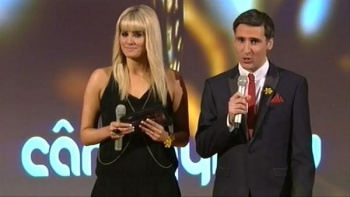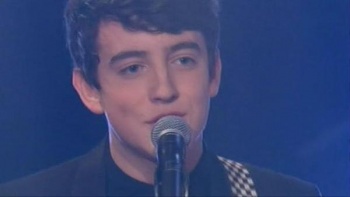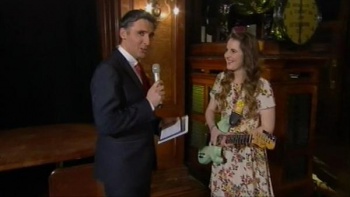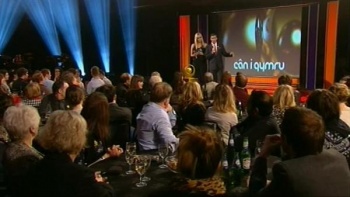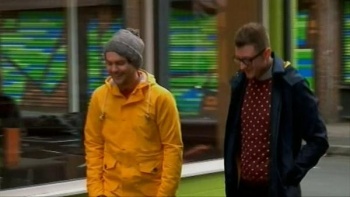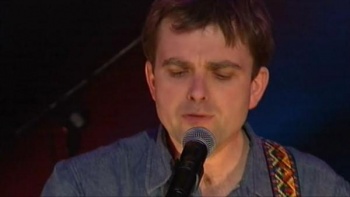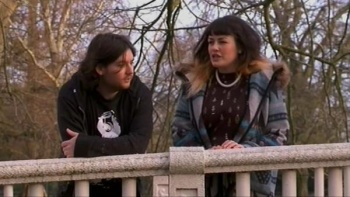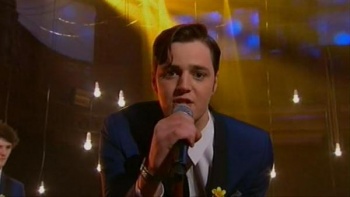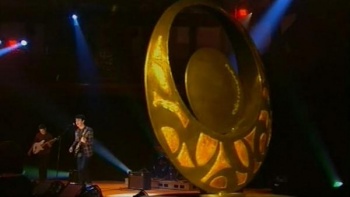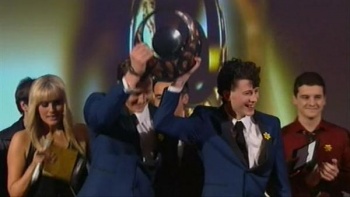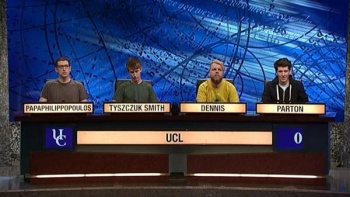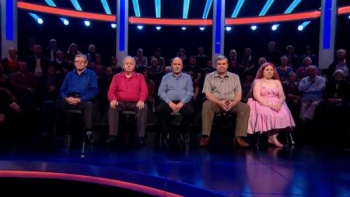Weaver's Week 2013-03-10
Last week | Weaver's Week Index | Next week
This week's lead review was written last weekend. We've not updated it in the light of subsequent events in the land of Welsh song.
Contents |
Can i Gymru
S4C, 1 March
By tradition, the high-point of the British song contest season was A Song for Europe, the BBC's annual attempt to find something halfway decent for the Eurovision Song Contest. Since about the turn of the century, the Beeb has given off distinct "can't be bothered" vibes. They relegated the selection process to a single programme at teatime on Sunday, then they turned it into a buy-one-get-one-free offer declaring two winners. For the last few years the Eurosong selectors have given up on the democratic experiment and tried to find seasoned performers who can string together two good performances in a row. Neither Blue nor Englebert managed to achieve this modest ambition, and we have no great hope for this year's BBC selection, whoever it is.
With "A Song for Europe" consigned to history, it's down to the fringes to provide something that is democratic or a bit good. Or even both. Enter, stage left, "Can i Gymru", the Welsh national song contest. If the Eurovision is an all-singing, all-dancing massive spectacular, CiG is a battle of the bands from a workers' club. This year's contenders have had £900 to work with a producer in a studio, to help make their song just that little bit better. Eurovision probably spends that much on plasma display lighting during one performance. The six have had previews on "Heno", S4C's equivalent of The One Show. They stand to win a dream ticket to that European festival of culture, the Pan-Celtic Festival, and a cheque for £3500.
We should probably point out that our Welsh is a little better than it was last autumn, but only a bit, and most of the conversation here went completely over our head. We're not going to be judging the songs on their deep lyrical meaning, but on sound and presentation.
With six substantive performances in a two-hour programme, we're going to get some decently long postcards, doubling as profiles of the performers. First to perform is Rhydian Gwyn Lewis, singing "Bywyd Sydyn" (Fast life). He's a student from Cardiff and would spend the prize money on a Fender Jaguar. It's a lightly-amplified rock song, with some harmonies that we really grooved along to. A slight shame that the singer and his backing band stood stock still on the stage, almost mistaken for the microphone stands in front of them.
There's a CiG Expert Panel, four stars of the Welsh language pop scene. One of them is Gruff Rhys, who may be known to Anglophone readers for his work in the Super Furry Animals. Two of the panel are asked for their opinion by Elin Fflur, the front-of-house presenter. Like on BBC The Voice of Holland of UK, there's a split presentation: the female presenter is in the main room, the male presenter – Dafydd Du – is stuck backstage, talking with the performers after they've performed. Mr. Du's duties also include presenting some points from the viewers, in a section we're calling "Mannau Gan Chwi". Amongst the reactions to the first number is "Better than anything we had last year," so good news for us.
Song two is "Ein Tir Na Nóg Ein Hunain" (Our own never ever land), performed by Catrin Herbert. According to the description provided by S4C, she wants to transport the audience to a nice summer's day. In this weather, we're in! She's in a floral dress and cowboy boots (the latter picked up by Dafydd Du backstage). It's a deliberately retro-vibe, a song that's trying to be away with the fairies, and almost gets away with it. Possibly could do with being a touch higher in pitch. "Dim backing singers" according to Mannau Gan Chwi, which is a bit unfair, they seem intelligent enough. Nice, very nice, possibly a bit too nice.
Though it's the first time we've been allowed to see it, Can i Gymru has been going since the 1960s. It's the first time they've been in Cardiff, and this year's venue is the Coal Exchange. As the name suggests, it was once a large hall used to buy and sell coal, and there are still decorations from that era, including a clock stopped at 6pm. We've never been, and rather hope it's as atmospheric and awe-inspiring as the Royal Exchange, our favourite building in Manchester. Tonight, the Coal Exchange is a sit-down supper club, with a glass of wine in every hand, a bowl of crisps and a black cloth on every table, and some decoration around the sides. It's not The Shed in Leicester, is it.
"Amser Mynd i'n Gwlâu" (Time for bed) is our third song, performed by Geth Vaughan and Pete Jarvis. Pete is the only native English speaker we'll hear tonight. The song starts slowly, and they don't even get to the first chorus before breaking out the whistling. This is either going to boom into life, or it's peaked already... well, a bit of minor-key emoting, lots of electro-feedback, not sure we'd want to hear that again in a hurry. Only when doing the homework afterwards did we realise that this is a song written as a lullabye for a puppy, and now it makes a bit more sense.
"Psychadelic" is the presenter's view of this performance. One of the panel has to take a large drink before passing judgement on it, and that's suddenly seeming like a very good idea. One of the duo casts aspersions on the quality of contemporary cartography, saying how he hopes to put Prestatyn on the map. It's there, just between Pen-y-bont and Polldu.
Song number four is performed by Alun Evans, and it's "Breuddwydion Ceffylau Gwyn" (Dreaming of white horses). According to the write-up, it's a pop song that Alun hopes will take the listeners on a journey to the desert in their minds eye. What if our mind's eye doesn't have a desert? What if it's a piece of frozen tundra, laid waste by the icy fingers of another cold winter and the occasional thaw only to be cherished by the gift of rain from the rugby gods? The song began, it continued, and it finished. Passed us by completely.
The world of Welsh-speaking music is small, and it's no surprise to find past winners seeking more glory. Alun is already on the Can i Gymru winners list, having taken the top prize in 2010. Unlike Lena, he thought it would be a bit rude to invoke the winner-stays-on rule, and left it a few years for someone else to have a go.
The someones else with song five are Elin Parisa Fouladi and Ben Dabson, performing "Aur ac Arian" (Silver and gold). Cutting out the fluff from the posted biography leaves us with the fact that Ben has worked with K'naan. And fifty minutes into the transmission, the first appearance of some sheep during their postcard introduction.
Now, this is more like it. An epic rock beginning leads into a female solo vocalist, somewhere in the Paloma Faith mould – a voice on the edge of cracking, it seems. Elin almost spits out her lines, doing soft bits (they don't work on the telly) and loud bits (crikes, they work). What's more, she's the first singer to move about the stage at all. And it's enough to set the viewers off. "Just yn diabolical" and "Pitch yn opsional" are two Mannau Gan Chwi we don't need to translate. "Epic" is another. Just about our fave of the night so far, but there's one to come.
"Mynd i Gorwen Hefo Alys" (Going to Corwen with Alys) is the final song, performed by Jessop a'r Sgweiri. It's a five-piece band from Bangor university, and they want to spend the prize money on sharp suits. The instrumentation is nothing tremendous: twelve-bar blues, played by 50s rock 'n' rollers in quiffs and suits (we reckon they're sharp, but evidently not sharp enough).
It's when the vocal starts that our jaw drops. The vocalist looks like he's going to sing in a tenor register, maybe a high baritone. No, he's a bass singer, growling out the words, and turning the simple rock 'n' roll tune into something menacing and slightly terrifying. He has a great stage presence, picking up the microphone stand and (are we after the watershed?) using it as something to impress Alys. The word from Gryff is "fantasdig"; the word from us is "winner", thus ensuring that it won't win.
Unlike some shows (Splash!, we're thinking of you. Don't get used to it), there's a long Active Voting Window. It begins at 21.35 with extended recaps of the songs, and runs on through the interval act, through a couple more recaps, eventually closing about 22.17. Even though we've just seen it again, we can't remember song four.
The interval act is something new for CiG: the Welsh Music Awards. There's a presentation to the winners of the Live Band and Song of the Year, as decided by "Y Selar" magazine; the Breakthrough Band as determined by Radio Cymru's Roc a Phop awards; and Composer who has made a substantial contribution to the Welsh Music Scene, chosen by the Can i Gymru judging panel. Most of these are followed by performances by the winners. We found this section dragged a little, but that could be because we don't know the winners from Efa and can barely follow the interviews.
Eventually, the time has come to name the winners. Elin Fflur has the golden envelope, Dafydd is with the contenders backstage, and we see their reaction when they hear the winner is "Mynd i Gorwen Hefo Alys". Blimmin' 'eck! Like the stopped clocks in the Coal Exchange, we're right on occasion. Jessop a'r Sgweiri return to the stage, reprise their winning song, and are showered with stage confetti. S4C plays out the credits right to the end, they don't cut them off half-way through like some other broadcasters we could mention.
So this remarkable song, deep-voiced and charismatic, was voted the best song in Wales by the people of Wales. It's the standard by which we'll judge the BBC's selection for the Eurovision Song Contest, as adjudicated by about three people in the BBC.
University Challenge
Group phase, match 5: Manchester v UCL
Manchester's win in the group phase was against Imperial, UCL had a win over Bangor, and we'll meet those sides next week. UCL get the show going with a missignal, confusing their nerd and their geek. Is there a difference? The teams swap starters thereafter, with almost all of the bonuses answered correctly. UCL has a 45-40 lead at the first visual round, on polar graphs of functions. No, us neither.
We were fascinated by a set of bonuses on language homogeneity, and that there's a 14% chance that two random Brits will have different first languages. UCL don't even need to hear the whole question before naming David Hilbert as their favourite German mathematician, Manchester don't need to hear all five synonyms for NATO phonetic alphabet words that spell out Janet. UCL had a good second stanza; they're 120-70 ahead after the audio round, on classical pieces selected by politicians for "Private Passions" on Radio 3. It's like "Desert Island Discs", only concentrating on music not personality.
UCL have a set of bonuses on lung diseases, but no-one has thought to put in a question about pneunoultramicroscopicsilicovolcanoconiosis. Honestly! Did Bryan the Catchphrase computer not leave a legacy? Three points for the longest word to us, UCL leads by 165-70 when no-one gets the second visual round on etchings of mediaeval scenes. Manchester needs to make a strong comeback, like they did against Lincoln Oxford, and the return looks on with a couple of starters and bonuses about very populous counties in north America. UCL pull back ahead with former European capital cities; Manchester need only a few words to describe their favourite German mathematician, Liebniz.
Manchester needs to sweep the board from here, and they get the bonuses and the next starter. French volcanoes proves a bonus set too far, Martinique has to be right once. Not knowing the abbreviation behind a QR code costs time; knowing where to find Aconcagua is enough for UCL to clinch the game. At the gong, UCL has a clear win, 230-150. Everyone on Manchester got a starter, all on UCL took at least two, and Simon Dennis had four. UCL managed to get 23/35 on their bonuses, a remarkable conversion rate at this level.
Mastermind
Semi-final 3
Rob White starts us tonight, taking Scott's last journey (1911-12), the trip made by Robert Scott and his hand-picked crew to the South Pole, and their failure to return safely. The contender starts out well, wobbles slightly in the middle, and ends with "For God's sake, look after our people." 9 (0). Watch more: "Scott of the Antarctic"*.
Chris Quinn rejoins us with the Films of Mel Brooks (b 1926) Best known for his comedy films, Brooks is responsible for such works as "Blazing Saddles", "Silent Movie", "Space Balls", and the Shrek-inspiring "Robin Hood: Men in Tights". Of relevance to us, he was also a regular on the North American version of Celebrity Squares. One reason to disagree with the answers, so 10 (0). Blaze more: "Blazing Saddles"*.
Richard Tarleton has the Life and Poetry of WB Yeats (1865-1939). A poet and dramatist, Yeats was inspired and influenced by Oscar Wilde and George Bernard Shaw. His early opus were opaque and romantic; later works chronicled the rise of Irish nationalism in clear language. He won a Nobel Prize for literature, the subject of the first question here; the round concludes on 6 (3). Read more: "Collected Poetry"*.
Andrew Frazer tells us tonight about Otto von Bismarck (1815-98). As Chancellor of Prussia, he engineered the Franco-Prussian war of 1870, bringing about a united Germany, annexing Alsace-Lorraine, and imposing a harsh peace on France. By refusing demands for greater democracy, he indirectly inspired Karl Marx. A very swift round brings up the Perfect Round bells, 11 (0). Research more: BBC history bio.
Rachael Neiman has been reading the Novels of Sarah Waters (b 1966). Such works as "Fingersmith" and "Tipping the Velvet" have attracted a cult audience, television adaptations, and prize nominations. According to her website, Waters started out by writing Dr. Who fan-fiction. This contender has another good score, 11 (0). Wiggle more: "Fingersmith"*.
Judging from the heats, all of these contenders are a bit good. Richard Tarleton is the first of three to have got here with 27 points, when he won with Shakespeare's Tragedies (11 Jan). The strong general knowledge round on that night isn't repeated here, he closes on 13 (7).
Rob White qualified with Thomas Hardy (21 Dec). He also had 27 points then, and picks up points carefully – one of the answers is about Strasbourg, a city taken over in the Franco-Prussian war. 18 (2) is the final score.
On pass countback, Chris Quinn only finished third on 2 November, taking Roddy Doyle. It's clear that the rule has been tweaked to bring back the six best losers, regardless of their position in the heat, which we think is A Good Thing. Mr Quinn scored 19 in his general knowledge stand last time, as did the next two players, but there are a few errors and passes in his round tonight. His final score is also 18 (2).
Andrew Frazer had our pulses racing on 7 December; "When the Boat Comes In" was his specialist, and he came within one question of a Perfect Game. His score of 35 is the highest of the heats. The chance of a Perfect Game here ends with the second question, in which he confuses Hurst and Peters from the 1966 England men's football team. It's a little while before he regains his poise, but finishes with jet propulsion on his answers. 21 (0) may not be enough.
Rachel Neiman scored 33 with John Peel's Festive Fifties, on 16 Nov. Hers is the second-highest score of the heats, so one favourite must fall tonight. The contender cannot remember the career of Louise Mensch, showing her good taste. She is answering swiftly and crisply, but making a few errors. The contest goes down to the final question: an error means she finishes on 20 (0).
So Andrew Frazer, top of the finals board in the heats, is top of the scoreboard tonight and will rejoin us for the final next month.
This Week and Next
And just after we completed our review of Can i Gymru, the BBC announced its entry for the senior Eurovision Song Contest. It's written by Desmond Child ("Living on a prayer", "Livin' la vida loca"), Lauren Christy of production team The Matrix, and Chris Braide, writer for S Club 6. But mostly Desmond Child, which explains why the BBC is trying to win the 1988 contest. Don't expect votes from Yugoslavia. It's an adequate song, performed by rock-chick Bonnie Tyler in a manner that is familiar to those of us who have been watching the 1970s Top of the Pops reruns. We expect at a position in the top half of the screen, on the right-hand side. Jessop a'r Sgweiri wouldn't do tremendously better, but they would demonstrate that the UK is prepared to engage with Eurovision as it is in the 21st century, not according to the folk memories and stereotypes at the BBC.
Brain of Britain's semi-finals continued, and this week saw the return of Paul Jordan. He was in the lead after one question. Then David Stainer drew level and took the lead, and would never again be headed in the competition. For the first half, all of the contenders were in the running, Mr. Stainer had but a fragile lead going into the Beat the Brains segment. Then he pulled away, a five-in-a-row seemed to galvanise his performance and rob the others of confidence. For the second time, Mr. Stainer scored more points himself than all his fellow competitors combined. He goes through to the final on 18 March, a swift rematch with Barry Simmonds from Eggheads and Only Connect.
In other news, the BBC is looking for the next Blue Peter presenter. Suitable contenders must not be scared of heights, must not be scared of dogs, must be able to make a chocolate log while conducting an interview with the cast of Sadie J, must be able to decode Barney Harwood's cryptic codes (the one from the gadget special? We have no clue). And the suitable presenter must win a vote amongst the viewing public following televised trials hosted by Dick and Dom. "So You Think You Can Be a Blue Peter Presenter" is a working title, and it's likely to be on CBBC in the summer.
Paul Hollywood is going to Hollywood; he's been signed up to judge The Great American Baking Competition, CBS's version of The Great British Bake Off. The closest they could get to Mel and Sue is some bloke called Jeff Foxworthy, which tells us only that they're really, really not trying hard enough. Was Rosie O'Donnell washing her hair at the time?
Broadcasting regulator OFCOM released its complaints bulletin this week. Of most interest was the decision on fairness complaints brought by Zoe Alexander and her father Glenn Smith from The X Factor last year. Though submitted apart, we're going to cover them together.
The background is that Zoe was encouraged by The X Factor producers to attend in her day job, as a Pink impersonator. She dressed in a similar style to the international star, and performed a song made famous by Pink. It's agreed that Zoe did not initially submit a Pink song, only relenting on her third list after what appears to be pressure by The X Factor producers.
A number of complaints had to be left hanging, because Zoe said one thing, The X Factor contradicted her, and OFCOM didn't have evidence to form a decision. These included about whether the stage monitors (speakers directed towards the performer) were turned off, and whether the producers had changed the backing track Zoe supplied.
It's accepted that Zoe took her rejection from the competition badly, using strong language and moving various stage props in an abrupt manner. Zoe and her father complained about the editing, alleging that there had been digital manipulation and the panel's negative comments had been added after the fact. The X Factor denied all of this, and most of the points were not demonstrated by the uncut footage.
So far as this column can tell, the nub of the dispute is whether The X Factor leaned on Zoe to perform a song she'd rather not do so. Given the contents of the published report – only a summary of the evidence – this column reckons The X Factor did lean on Zoe. They didn't tell her to perform as Pink, they did make it very clear that they would like her to be a Pink impersonator. It's also a fact that The X Factor deliberately chose to show this footage, it would be entirely possible to leave it out and only show footage of continuing contestants.
Does that amount to manipulation of the contest, and manipulation of the viewer? This column suggests it does: without meddling by the producers, Zoe would have turned in a different performance, the producers would have had to make a different show, and the viewer would have formed a different opinion of the performer. OFCOM has adopted a different standard, it doesn't like following consequential chains like we've done, and hence has reached a different opinion. We fear that unscrupulous producers will interpret this decision as permission to intimidate aspiring talent.
Difficult questions have also been raised at an industrial tribunal hearing between Alan Sugar of Amstrad and his former employee Stella English, winner of The Apprentice in 2010. This case continues; we'll have more when it's finished.
BARB ratings in the week to 24 February showed Saturday Night Takeaway is back, and straight in as the number one game show, with 6.4m viewers. Dancing on Ice held second with 6.1m, but Let's Dance for Comic Relief suffered, losing over a million on the prior week to end on 5.35m. Family Fortunes had 4.85m, Take Me Out finished with 4.15m, and The Chase recorded 3.5m. BBC2's top game remains University Challenge (2.8m); Great British Menu has edged up to 2.15m. 8 Out of 10 Cats is top for Channel 4, with 1.95m viewers. Little to note on the new channels: Got to Dance 4 (675,000, The Satellite Channel); Come Dine with Me (550,000, More 4) and QI XL (400,000, Dave) the top three. Pop Idle Us is up to 245,000 on 5*, still less than half its audience on ITV2 last year.
This week has the final of Dancing on Ice (ITV, 7pm Sun). There's a special episode of Only Connect (BBC4, 8.30 Mon), a new run of Masterchef (BBC1, 9pm Tue), and it's Comic Relief night (BBC1, 7pm Fri). An interesting juxtaposition next Saturday, as France's quest for the wooden spoon (BBC2, 7.30) overlaps with an emergency Pointless repeat (BBC1, 7.15) with Fatima Whitbread and Joe Pasquale. What? France picked up a draw yesterday? Ant and Dec will be trying their foot at Riverdance (ITV, 7pm), so ask the spiders behind the sofa to make room.
Next week, we expect to be reviewing The Common Denominator, linking Catherine Zeta-Jones to the Isle of Man without going via "Swedish Made Simple".
To have Weaver's Week emailed to you on publication day, receive our exclusive TV roundup of the game shows in the week ahead, and chat to other ukgameshows.com readers, sign up to our Yahoo! Group.

